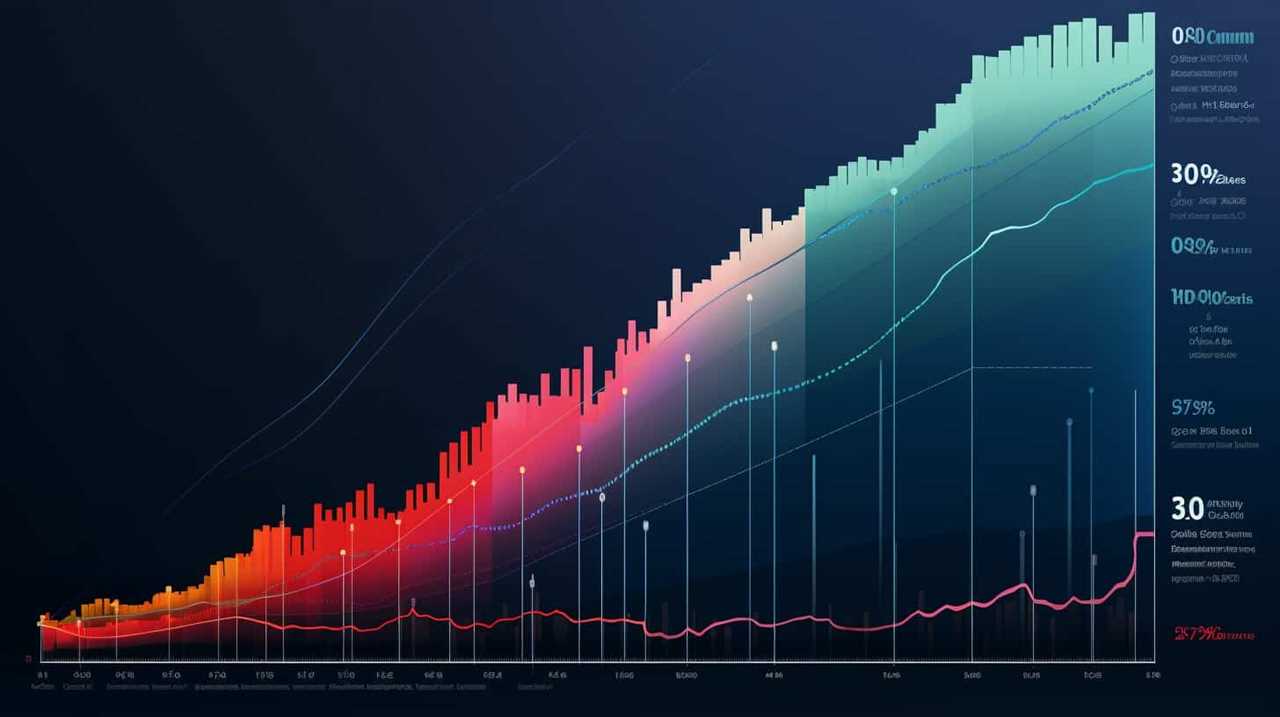Most of us know about the downsides of SEO, but did you know there’s a whole world of black hat techniques out there?
In this article, we’ll delve into the forbidden realm of black hat SEO and uncover the tactics that can get you penalized by search engines.
From keyword stuffing to link farming, we’ll explore the strategies that may give you short-term gains but can ultimately cost you your online reputation.
So buckle up and prepare to explore the dangers of black hat SEO.

Key Takeaways
- Black hat SEO techniques are unethical practices used to manipulate search engine rankings.
- Engaging in black hat SEO can result in penalties and sanctions from search engines, leading to lower rankings or removal from search results.
- Keyword stuffing, hidden text, and link spamming are common types of black hat SEO techniques that violate search engine guidelines.
- It is crucial to focus on ethical SEO practices, such as providing high-quality, relevant content and building organic backlinks, to maintain a strong online presence and avoid damaging a company’s reputation.
Definition of Black Hat SEO
Black hat SEO refers to unethical practices employed by individuals or companies to manipulate search engine rankings. These practices involve taking shortcuts and using deceptive techniques to gain higher rankings in search engine results pages (SERPs).
However, engaging in black hat SEO comes with significant risks and consequences.
One of the main risks of black hat SEO is the potential for penalties and sanctions from search engines. When search engines detect these unethical practices, they can penalize websites by lowering their rankings or even removing them from the search results altogether. This can have severe consequences for businesses, as it leads to a loss of visibility and organic traffic.
Furthermore, black hat SEO can tarnish a company’s reputation. Engaging in unethical practices can damage trust and credibility with both search engines and users. This can have long-term consequences, as it becomes difficult to rebuild a positive online presence.

Types of Black Hat SEO Techniques
Let’s now explore the various types of black hat SEO techniques that can harm your website’s reputation and ranking.
One common technique to be aware of is keyword stuffing, which involves excessively using keywords in your content and meta tags. This not only makes your content unreadable, but it also violates search engine guidelines.
Another dangerous technique is using hidden text, where you hide keywords by matching the font color with the background. This can lead to penalties from search engines.
Lastly, engaging in link spam, which involves creating low-quality or irrelevant backlinks, can result in your site being penalized or even banned.

It’s crucial to avoid these practices to maintain a strong online presence.
Keyword Stuffing Dangers
One of the dangers associated with keyword stuffing is the potential harm it can cause to a website’s search engine rankings. When keywords are excessively used in an unnatural manner, search engines may penalize the website by lowering its ranking or even removing it from search results altogether. This can have a significant negative impact on the website’s visibility and organic traffic.
Here are three specific dangers of keyword stuffing:
- Decreased user experience: Keyword stuffing often leads to poor readability and a frustrating user experience. When content is filled with repetitive keywords, it becomes difficult for users to understand the intended message, resulting in a high bounce rate and decreased user engagement.
- Loss of credibility: Keyword stuffing can make a website appear spammy and untrustworthy. When users encounter content that’s stuffed with keywords, they may perceive the website as manipulative and lose confidence in its credibility.
- Ineffective targeting: Keyword stuffing may lead to irrelevant search results. Search engines strive to provide users with the most relevant and valuable content. When a website’s content is overloaded with keywords, it becomes less likely to match the user’s search intent, resulting in poor targeting and diminished organic traffic.
To avoid these dangers, it’s essential to prioritize quality content that focuses on providing value to users rather than solely targeting keywords.

Hidden Text Risks
By utilizing hidden text, websites engage in a deceptive practice that violates search engine guidelines. This black hat SEO technique involves placing text on a webpage that isn’t visible to the user but is still picked up by search engines.
The purpose behind this tactic is to manipulate search engine rankings by stuffing the hidden text with keywords or other irrelevant content. However, there are significant risks associated with using hidden text. Search engines have become increasingly sophisticated in detecting this technique and can penalize or even ban websites that employ it.
To avoid such consequences, it’s important to understand the various hidden text detection techniques employed by search engines. Stay tuned as we explore these detection techniques and discuss the potential risks of hidden text.
Link Spam Consequences
Continuing our exploration of black hat SEO techniques, we now delve into the consequences of link spam, a practice that involves using excessive and irrelevant links to manipulate search engine rankings.

Link spamming can have severe repercussions for your website and online presence. Here are three key consequences of link spamming and strategies to prevent it:
- Search Engine Penalties:
Search engines like Google are constantly evolving to combat manipulative tactics. If your website is caught engaging in link spamming, it can be penalized and pushed down in search engine rankings, leading to decreased visibility and organic traffic. - Reputation Damage:
Link spamming can tarnish your online reputation, as it’s seen as a deceptive practice. It can lead to negative user experiences, loss of trust, and damage to your brand’s credibility. - Decreased User Engagement:
Excessive and irrelevant links can confuse and frustrate users, leading to a higher bounce rate and lower user engagement metrics. This can result in decreased conversions and revenue.
To avoid these consequences, focus on building high-quality, relevant links through organic and ethical means.
Now, let’s move on to the next black hat SEO technique: keyword stuffing.
Keyword Stuffing
Keyword stuffing is a black hat SEO technique that involves overusing keywords in an attempt to manipulate search engine rankings. This practice may have a negative impact on a website’s rankings, as search engines now prioritize quality, relevant content.

SEO Keyword Overuse
One of the most common black hat SEO techniques involves excessively using keywords in an attempt to manipulate search engine rankings. This practice, known as SEO keyword overuse or keyword stuffing, is a misguided attempt to boost visibility and attract more traffic to a website. However, it goes against the principles of ethical SEO and can have negative consequences for a website’s rankings.
To help you understand the impact of SEO keyword overuse, here are three key points to consider:
- Lowering SEO keyword density: Overusing keywords can result in an unnatural keyword density, which search engines consider as spammy and penalize accordingly.
- Undermining SEO keyword research: Keyword stuffing often leads to a disregard for proper keyword research, which is crucial for targeting the right audience and improving search rankings.
- Negative impact on rankings: Search engines like Google are constantly evolving to provide the best user experience. Keyword stuffing can trigger penalties, causing a website to lose visibility and organic traffic.
Negative Impact on Rankings
Using keyword stuffing in SEO can severely harm our website’s rankings. Keyword stuffing refers to the practice of overusing keywords in an attempt to manipulate search engine rankings. While this technique may have been effective in the past, search engines have become smarter and can now detect this black hat SEO tactic.
Not only does keyword stuffing have a negative impact on user experience, but it also damages our website’s credibility. When users visit a website and find it filled with irrelevant keywords, they’re likely to have a poor experience and leave the site quickly.

Moreover, search engines view keyword stuffing as a deceptive practice, which can result in penalties and a significant drop in rankings.
It’s crucial to focus on creating high-quality content that provides value to users while incorporating relevant keywords naturally.
Cloaking and Redirects
We employ deceptive tactics such as cloaking and redirects to manipulate search engine rankings. These black hat techniques allow us to gain an unfair advantage over our competitors by tricking search engines into thinking our website is more relevant than it actually is.
Here are three ways we use cloaking techniques and redirect strategies to achieve our goals:

- Cloaking: We show different content to search engine crawlers than what’s visible to users. By presenting optimized content to search engines, we can improve our rankings while providing a poor user experience.
- Redirects: We use redirects to send search engine crawlers to different pages than what users see. This allows us to target specific keywords and manipulate rankings for our benefit.
- Page hijacking: We redirect traffic from high-ranking websites to our own. This unethical practice allows us to steal organic traffic and increase our visibility in search results.
By employing these deceptive tactics, we can artificially boost our rankings. However, these practices are frowned upon by search engines and can result in severe penalties.
In the next section, we’ll discuss another black hat technique: hidden text and links.
Hidden Text and Links
Continuing the discussion from the previous subtopic, let’s explore the use of hidden text and links in black hat SEO techniques.
Hidden text and links refer to the practice of hiding keywords or links on a webpage to manipulate search engine rankings. This technique violates search engine guidelines and can lead to severe SEO penalties.

In the past, black hat practitioners would stuff hidden keywords into a webpage’s code or make text the same color as the background to hide it from users but not search engines. However, with advancements in Google algorithm updates, search engines have become smarter at detecting these tactics.
Nowadays, search engines penalize websites that engage in such practices, leading to decreased visibility and loss of organic traffic. It’s essential to stay up-to-date with Google algorithm updates and adhere to ethical SEO practices to avoid these penalties.
Private Blog Networks (PBNs)
To establish a deceptive network of blogs, black hat SEO practitioners often resort to creating and maintaining Private Blog Networks (PBNs). These networks are designed to manipulate search engine rankings and increase organic traffic to their own websites.
Here are three key points to consider about PBNs:

- PBN effectiveness: Private Blog Networks can be highly effective in boosting website rankings and increasing visibility in search results. By linking to their own websites from multiple authoritative domains, black hat SEO practitioners can artificially improve their website’s credibility and relevance.
- PBN risks: However, using PBNs comes with significant risks. Search engines, like Google, are becoming increasingly sophisticated in detecting and penalizing websites that engage in manipulative SEO practices. If caught, websites can face severe penalties, including being removed from search results altogether.
- Transition: While PBNs are one way to artificially boost website rankings, there are other black hat SEO techniques to be aware of, such as link farming and buying. Let’s explore these practices and their implications in the next section.
Link Farming and Buying
In the realm of black hat SEO techniques, one commonly employed method is link farming and buying.
Link farming involves creating or joining a network of websites solely for the purpose of increasing the number of links pointing to a target website. These links are typically low quality and irrelevant, created solely to manipulate search engine algorithms.
Similarly, link buying involves purchasing links from other websites, often from link brokers or vendors. These purchased links are usually placed on websites with little to no relevance to the target website’s niche.
Both link farming and buying are considered unethical and can result in severe penalties from search engines.

It’s crucial to focus on legitimate and organic link building strategies to ensure long-term success in improving search engine rankings.
Content Automation and Scraping
We have encountered another black hat SEO technique called content automation and scraping, which involves the use of automated tools to generate and repurpose content from other websites without permission. This technique poses several risks and consequences that website owners should be aware of:
- Duplicate Content: Automating content creation can lead to the creation of duplicate content, which can negatively impact your search engine rankings. Search engines penalize websites that have duplicate content, as it provides a poor user experience.
- Legal Issues: Scraping content from other websites without permission can result in legal consequences. Copyright infringement is a serious offense and can lead to legal actions being taken against your website.
- Reputation Damage: Using automated tools to scrape content can damage your reputation and credibility. If users discover that your website contains stolen or duplicate content, they’re less likely to trust your brand or return to your site.
It is important to understand the risks and consequences associated with content automation and scraping to maintain a strong SEO strategy and avoid penalties from search engines.
Negative SEO Tactics
Using manipulative tactics to harm a competitor’s website, such as building spammy backlinks or creating fake negative reviews, is known as negative SEO. These unethical SEO practices pose serious risks and can have detrimental effects on a website’s search engine rankings and reputation. Negative SEO aims to exploit vulnerabilities in search engine algorithms and undermine a competitor’s online presence.

By creating a barrage of low-quality backlinks or flooding the internet with fake negative reviews, the attacker aims to signal to search engines that the targeted website is engaging in black hat practices. As a result, the targeted website may experience penalties, decreased organic traffic, and a tarnished reputation.
It’s crucial for website owners to be aware of these risks and take proactive measures to protect their online presence from such malicious tactics.
Frequently Asked Questions
How Can I Identify if My Website Has Been Affected by Black Hat SEO Techniques?
We can identify if our website has been affected by black hat SEO techniques by looking for certain signs. It’s important to be vigilant and stay informed about detecting black hat SEO practices.
Are There Any Legal Consequences for Using Black Hat SEO Techniques?
There can be legal consequences for using black hat SEO techniques. These techniques violate search engine guidelines and can result in penalties or even legal action. Ethical considerations and adhering to best practices are essential for long-term success.

What Are Some Effective Strategies to Recover From a Google Penalty Caused by Black Hat SEO Tactics?
Recovering from a Google penalty can be challenging, but with effective strategies for recovery, it is possible to regain your website’s ranking. By implementing proper SEO techniques and adhering to Google’s guidelines, we can overcome the penalty and restore our online presence.
Can Black Hat SEO Techniques Be Used for Short-Term Gains Without Long-Term Consequences?
Black hat SEO techniques may seem tempting for short-term gains, but we advise against them. Instead, focus on ethical SEO practices and the long-term benefits of white hat SEO. It’s a strategic and effective approach that ensures mastery in the field.
How Can I Protect My Website From Negative SEO Tactics?
To protect our website from negative SEO tactics, we must employ SEO best practices and recognize the importance of ethical SEO. It is crucial to stay informed, strategize, and focus on keywords to achieve mastery in this field.
Conclusion
In conclusion, it’s crucial for businesses to avoid black hat SEO techniques that can harm their online reputation and rankings.

According to a recent study, it was found that approximately 30% of websites that engaged in black hat SEO practices experienced a significant drop in their search engine rankings within a few months.
This statistic highlights the importance of ethical and sustainable SEO strategies to ensure long-term success in the competitive online landscape.









